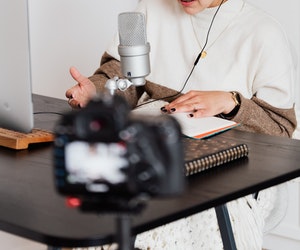Make the Best Out of your Interviews with Interview Transcription

Ever had those interview sessions where you had to frantically scribble notes while at the same time trying so hard to pay attention to your interviewee? You bet you didn’t get everything you intended to from the interview. It is quite easy for crucial points to pass you as you try to keep your writing speed up with you’re the other party’s speaking speed. For many like journalists, researchers and others, such sessions are some of the worst experiences they have had. Either because they didn’t grasp all the information they needed to or their interviewees found them downright clumsy, trying to handle many tasks at the same time.
In truth, those being interviewed often find it not so professional to be booked for a session and their interviewer spends all the time questioning them and writing. Apart from this making you look unprepared, it creates an awkward atmosphere lacking warmth because as you’re busy scribbling off notes, you will barely have time to connect with the other party. As we all know there are many ways of communication and body language is just one of them. Professionally, an interviewer needs to connect with his interviewee body, soul, and mind. This hardly happens without paying full attention.
So what’s the way out of this? Today we will explore some different methods that you can use to tackle your interview sessions successfully.
- Get someone to accompany you to the interview so while you listen, he will be writing
While this may be a good idea, interviewees sometimes get uneasy with a passive third party in the session. The second downturn with this option is that human is to err. Unless you get a fast writer and keen listener, you are bound to miss out on some crucial points. Thirdly, people have different levels of understanding so someone may not be in a position to bring out a point exactly the same way you would illustrate it.
This option can be good but not for lengthy detailed interviews.
- Record the interview and have it transcribed using speech to text software.
Recording an interview is perhaps the best option because you can refer to it in future. However, limitations come with employing software to do your transcription. Much as they are fast, you will not get the benefits of researching unfamiliar terms on the internet, accurate punctuation, and proof reading which humans do. Remember, humans can never be totally replaced in not only interview transcription but all forms of transcription.
- Record the interview and transcribe it yourself at a later time
Doing the transcription yourself may be good but if you are not a qualified transcriber it becomes a challenge. First, it takes your precious time and second, accuracy and professionalism are compromised. Again, f you have tons of recorded interviews waiting to be transcribed, you get overwhelmed and this affects your productivity.
At this level, it is best delegating your interview transcription tasks so you can have ample time to concentrate on interviews.
- Record the interview and seek for professional transcription services
This is by far the best option. Whether you have just one recorded interview or a number of them, you can have them transcribed at affordable rates and with utmost quality and professionalism. This option is cost effective if time is a factor for you. Again, you are assured of fast professional interview transcription services so you save yourself the trouble of proofreading and formatting.
At cabbagetreesolutions.com we have all it takes to transcribe your recorded interviews; affordability, professionalism, speed, quality and accuracy.
Contact us today for a free quote.

